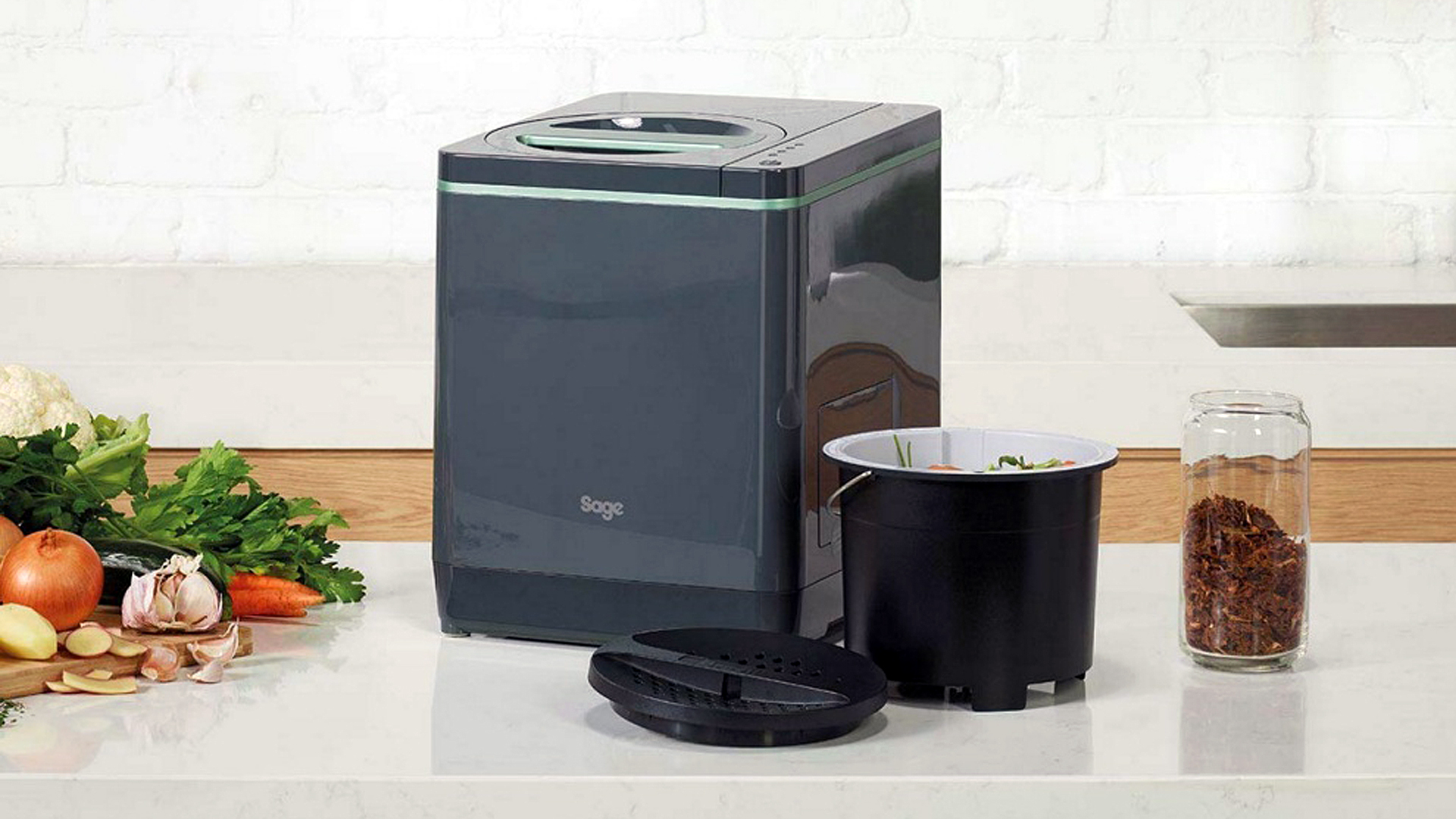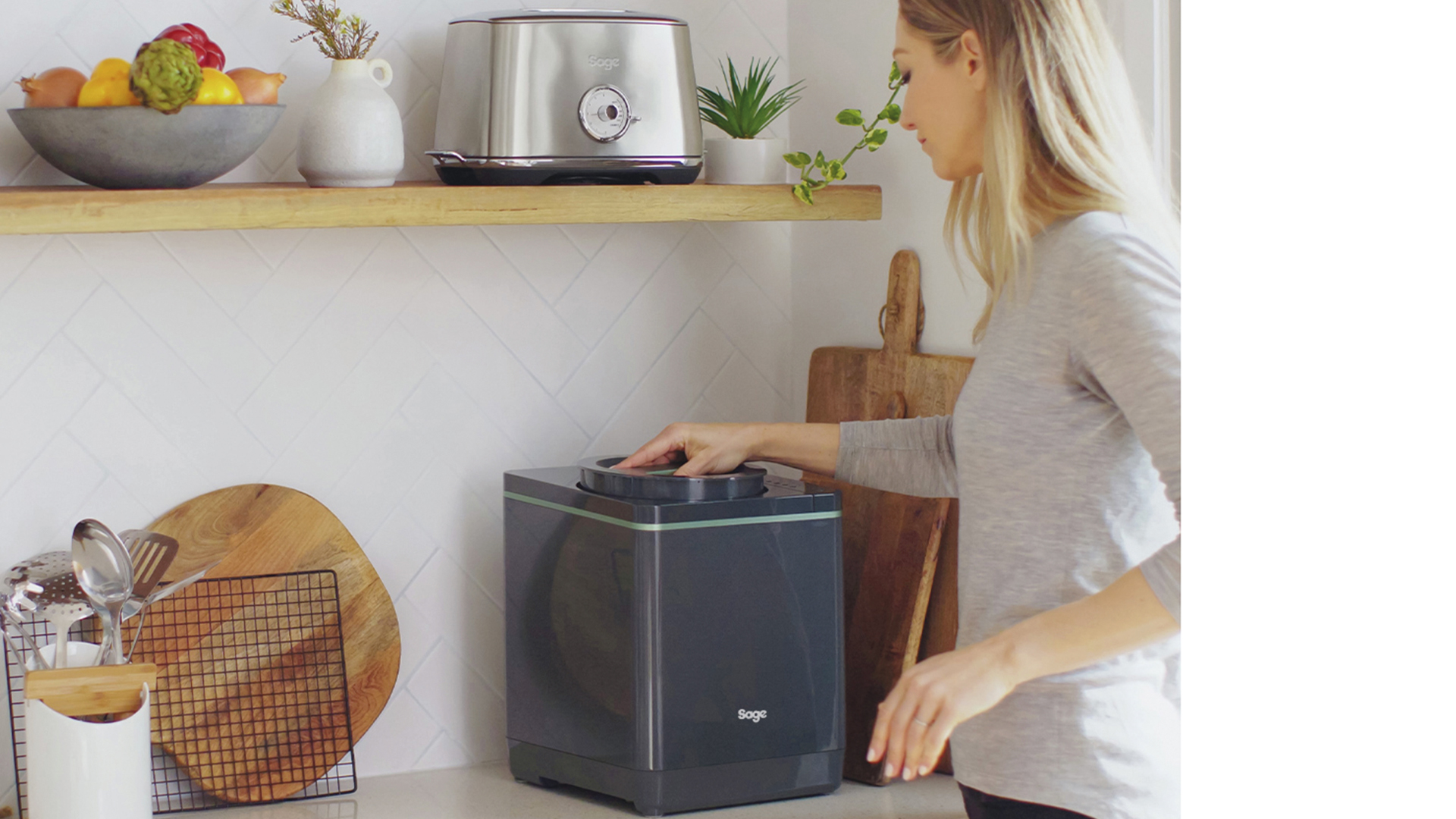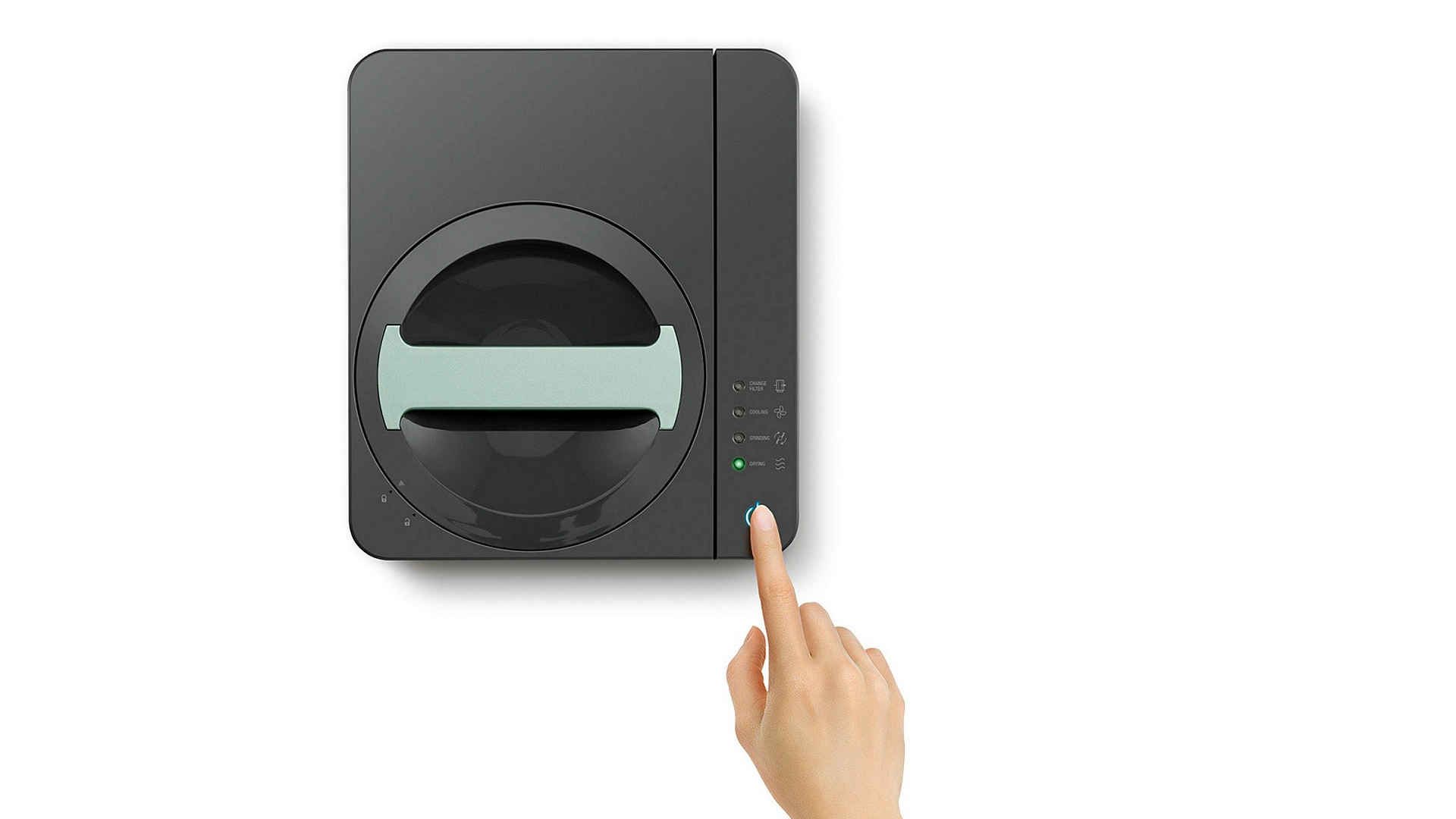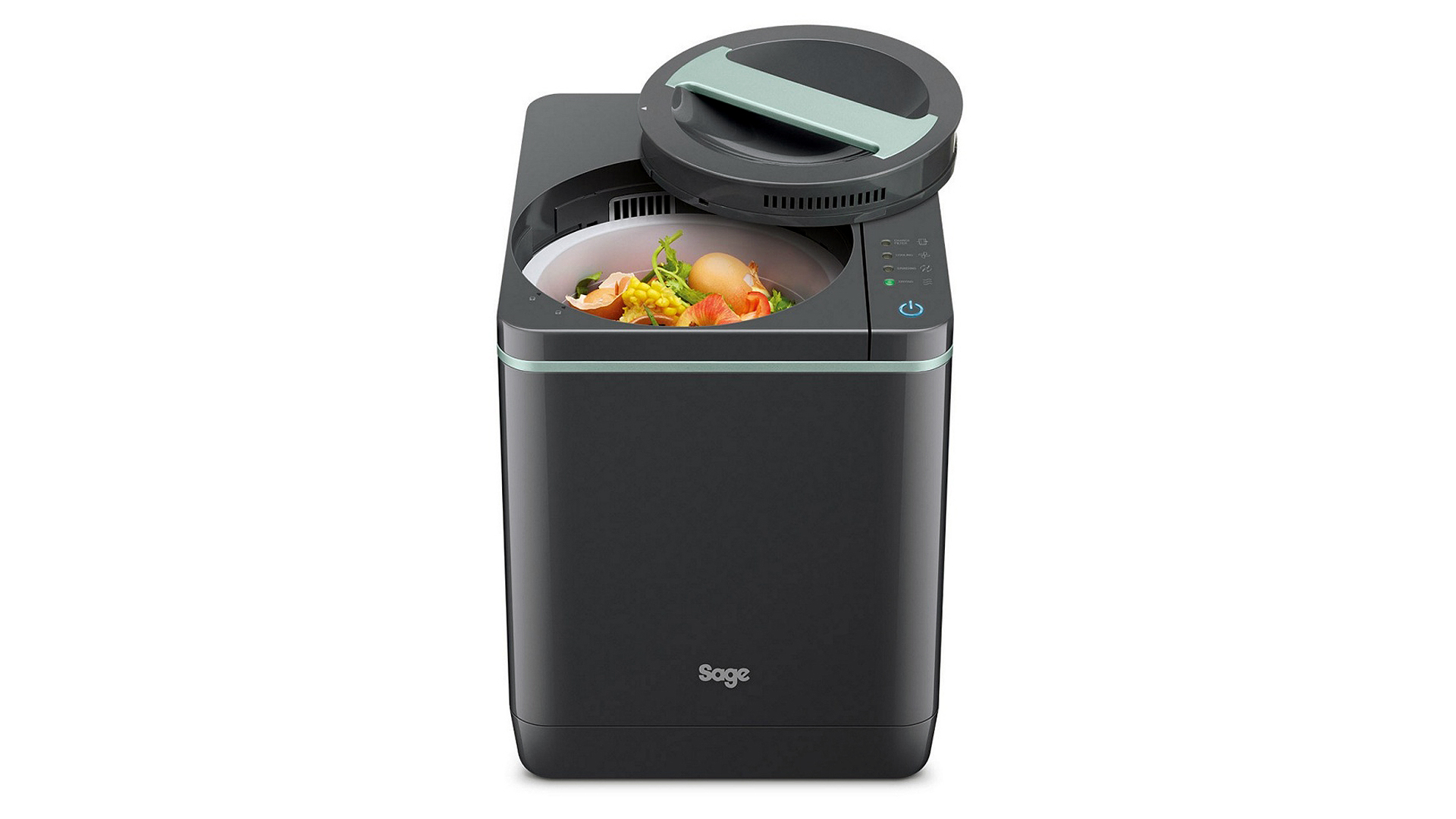I'm turning my food waste into high-tech compost with Sage FoodCycler
Miracle machine dehydrates and grinds almost any human food into plant food


Food waste is something we all worry about. Or at the very least, it's one of the things we pretend to care about, but don't really do anything about. In most urban environments, it's not really practical to maintain a compost heap, and while a lot of local councils do collect food waste nowadays, this unfortunately involves keeping a bin full of rotting food in your kitchen. Weirdly, not everyone is totally enthusiastic about this idea. The Sage FoodCycler, however, offers a solution to food waste and it is rather ingenious.
In the UK as it stands, we throw away 6.6 million tonnes of food waste per year. This is, apparently, 'enough to fill 66 three-bedroom houses'. So like an entire housing estate full of rotting meat, fish and vegetables. How nice.
I've been using the FoodCycler for a month now and I love it. But then it is aimed almost specifically at me. For anyone who lives in a two-person household, has plants on the balcony, and lives in an area where there is no food waste recycling done by the local council, the FoodCycler is a superb device. And it just so happens all that applies to me.
If I was a family of six, didn't have any plants, and my council recycled food waste, its appeal would be drastically reduced. So thank you, Sage, for making a product just for me! Can everyone else now please follow Sage's lead on this? Thanks.
- Zwilling Fresh & Save is the ultimate food storage system
- Smeg has a new range of sexy cookware
- Nutribullet now makes a portable blender

Sage FoodCycler: price and availability
Sage FoodCycler costs £399 in the UK – direct from Sage, AU$499 in Australia where it is called Breville FoodCycler and $400 in the USA where it is called Vitamix FoodCycler FC-50. Eh?
Confusing details follow…
Now, pay attention as this bit is very confusing. Sage FoodCycler is actually a product made by a brand called FoodCycler, that's been rebadged by Sage. And Sage itself is a 'rebadged' brand, which is known as Breville in most of the English-speaking world. And why is that? Because there is a different brand called Breville that operates in the UK. And in America, Vitamix has clearly licensed the product instead of Sage/Breville. Got all that? Good.
Get all the latest news, reviews, deals and buying guides on gorgeous tech, home and active products from the T3 experts
You've had your EcoChips
Sage has long made some damn fine food preparation equipment. Now it's completed the natural cycle, by adding this food waste recycling machine to its range. The FoodCycler is a mechanised composting device that dries food waste, then grinds it into EcoChips™. These are, sadly, not chips that you can eat – imagine how delicious that would be! No, they are intended for easy and muck-free recycling, or use in your garden.
Having used the FoodCycler multiple times, I can safely say that what it produces are nothing like chips, and should in fact be called EcoStrands™. Whatever you call them, what comes out is sterilised and safe to put on your pot plants and window boxes. I have not found my balcony under attack by seagulls or overrun by carrion flies since using EcoStrands™.
This is despite the fact that cooked leftovers do come out smelling quite similar to when they were in meal form. In fact, some Chinese-style chicken came out smelling like a delicious Chinese chicken-flavoured snack product. I was able to resist the urge to eat it, but only just.
Designed to sit in a spare space in your kitchen, garage or laundry room, the FoodCycler looks not unlike one of Sage’s ice cream makers – although don’t get them mixed up, or your day will be well and truly ruined. Compared to most countertop bins it’s on the large side, but then on the other hand, compared to an industrial waste processing factory, it’s very small.
All you have to do is put your daily food scraps into its internal bin and seal the lid to keep odours in. Once enough has built up, you can commence the composting process.

Press this button, then walk away
All this involves from your point of view is pressing one button. This sets the FoodCycler off on a three-stage process, which is best done overnight, as it takes anything up to eight hours.
First, the waste is dehydrated. This is a low-energy process but the heat involved is enough to sterilise leftover food scraps – even meat and fish. Then a powerful grinder reduces the baked waste to about 20% of its original volume.
These low-odour chips/strands can then be put in your council food recycling bins, or spread on your garden or – more realistically – on potted plants. If you have a garden, you could just use a compost heap to break down your food waste.
Having said that, the genius of FoodCycler is that it can handle meat and fish leftovers – even chicken bones and fish bones, although not more dense bones from larger animals. It is perfectly possible to compost meat and fish in the traditional way but the results can be very unpleasant indeed. FoodCycler saves you from horrendous smells, dangerous bacteria and the likelihood of attracting vermin.
Sage says the system can pulverise and dehydrate nearly all types of food waste, including ‘fruit and vegetable scraps, meat, fish, shellfish, poultry, chicken and fish bones, cereals, dairy, eggs and shells, coffee grounds, filters and tea bags, beans, seeds and legumes, as well as pet food.’
The FoodCycler may not quite be sexy, but it’s about as attractive as an electric food waste pulveriser is likely to get. It’s also surprisingly quiet in operation. The main food bucket is also dishwasher proof – it’s porcelain-coated aluminium. Energy use is fairly low; equivalent to boiling a kettle about once every hour. Obviously, it’s not the speediest process, but you don’t have to do anything other than press one button and walk away, and it’s certainly quicker than leaving food waste to rot on a compost heap.

Obviously, there are some drawbacks to this. The food bin in this compact device only has a 2-litre capacity which really is not a lot. I have found that you can pack/crush a reasonable amount of stuff down into it, so it is large enough for my needs. However, if you have a large family or are just more prone to creating waste, you might find it inadequate.
The other problem I've found is that although that 2 litres of food waste is shrunk to a very small amount of EcoStrands™ – Sage says 0.34 litres, from a full bin – I had created enough to coat every single pot plant and window box on my balcony within a week. At this point, I am storing it in a large bucket, with a view to opening my own artisan, locally-sourced compost business. I think that could work well in my part of London. Or I might just start binning it, or scattering it at the local park.
Anyway, it’s surprisingly rare for me to get sent something genuinely new and useful, and while FoodCycler undoubtedly has its quirks, I for one love it.

Duncan is the former lifestyle editor of T3 and has been writing about tech for almost 15 years. He has covered everything from smartphones to headphones, TV to AC and air fryers to the movies of James Bond and obscure anime. His current brief is everything to do with the home and kitchen, which is good because he is an excellent cook, if he says so himself. He also covers cycling and ebikes – like over-using italics, this is another passion of his. In his long and varied lifestyle-tech career he is one of the few people to have been a fitness editor despite being unfit and a cars editor for not one but two websites, despite being unable to drive. He also has about 400 vacuum cleaners, and is possibly the UK's leading expert on cordless vacuum cleaners, despite being decidedly messy. A cricket fan for over 30 years, he also recently become T3's cricket editor, writing about how to stream obscure T20 tournaments, and turning out some typically no-nonsense opinions on the world's top teams and players.
Before T3, Duncan was a music and film reviewer, worked for a magazine about gambling that employed a surprisingly large number of convicted criminals, and then a magazine called Bizarre that was essentially like a cross between Reddit and DeviantArt, before the invention of the internet. There was also a lengthy period where he essentially wrote all of T3 magazine every month for about 3 years.
A broadcaster, raconteur and public speaker, Duncan used to be on telly loads, but an unfortunate incident put a stop to that, so he now largely contents himself with telling people, "I used to be on the TV, you know."